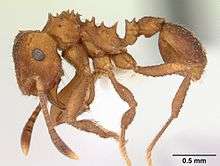Mycocepurus
Mycocepurus is a Neotropical genus of fungus-growing ants (tribe Attini) in the subfamily Myrmicinae. The genus is known from Mexico, south to Brazil and Argentina. Like other attines, they primarily grow fungi of the tribe Leucocoprini (family Agaricaceae). They use many different substrates for growing their fungi, from dry leaves and caterpillar dung to fruit matter.[3] One of its species, Mycocepurus smithii, which lives in South America, reproduces by cloning – all ants in a colony are clones of the queen.[4] M. castrator is a parasite of M. goeldii.[5][6]
| Mycocepurus | |
|---|---|
 | |
| Mycocepurus goeldii worker | |
| Scientific classification | |
| Kingdom: | Animalia |
| Phylum: | Arthropoda |
| Class: | Insecta |
| Order: | Hymenoptera |
| Family: | Formicidae |
| Subfamily: | Myrmicinae |
| Tribe: | Attini |
| Genus: | Mycocepurus Forel, 1893 |
| Type species | |
| Atta smithii[1] Forel, 1893 | |
| Diversity[2] | |
| 6 species | |
| Synonyms | |
|
Descolemyrma Kusnezov, 1951 | |
Species
- Mycocepurus castrator Rabeling & Bacci, 2010
- Mycocepurus curvispinosus MacKay 1998
- Mycocepurus goeldii (Forel, 1893)
- Mycocepurus obsoletus Emery, 1913
- Mycocepurus smithii (Forel, 1893)
- Mycocepurus tardus Weber, 1940
gollark: If you just want to toggle them on and off that's just redstone and easy.
gollark: Yes.
gollark: I don't know, figure it out or something, and I can help with small bits.
gollark: https://osmarks.tk/skynet2/I have this cool websocket-based intercomputer communication system, this is the web interface.
gollark: You can craft the computer quite easily, look at JEI.
References
- "Genus: Mycocepurus". antweb.org. AntWeb. Retrieved 13 October 2013.
- Bolton, B. (2014). "Mycocepurus". AntCat. Retrieved 6 July 2014.
- Mackay, W. P.; Maes, J.-M; Fernández, Patricia Rojas; Luna, G. (2004). "The ants of North and Central America: the genus Mycocepurus (Hymenoptera : Formicidae)". Journal of Insect Science. 4 (27): 1–7. CiteSeerX 10.1.1.622.2468. doi:10.1093/jis/4.1.27. PMC 1081568. PMID 15861242.
- Jamieson, Alastair (16 April 2009). "Females get along fine without males - in the world of tropical ants". The Daily Telegraph. Retrieved 27 August 2014.
- "Discovery: Deadbeat ant species branched off as parasite inside its own colony". Smithsonian Science. 21 August 2014. Retrieved 26 August 2014.
- Rabeling, Christian; Schultz, Ted R.; Pierce, Naomi E.; Bacci Jr., Maurício (21 August 2014). "A Social Parasite Evolved Reproductive Isolation from Its Fungus-Growing Ant Host in Sympatry". Current Biology. Cell Press. 24 (17): 2047–2052. doi:10.1016/j.cub.2014.07.048. PMID 25155509.
This article is issued from Wikipedia. The text is licensed under Creative Commons - Attribution - Sharealike. Additional terms may apply for the media files.